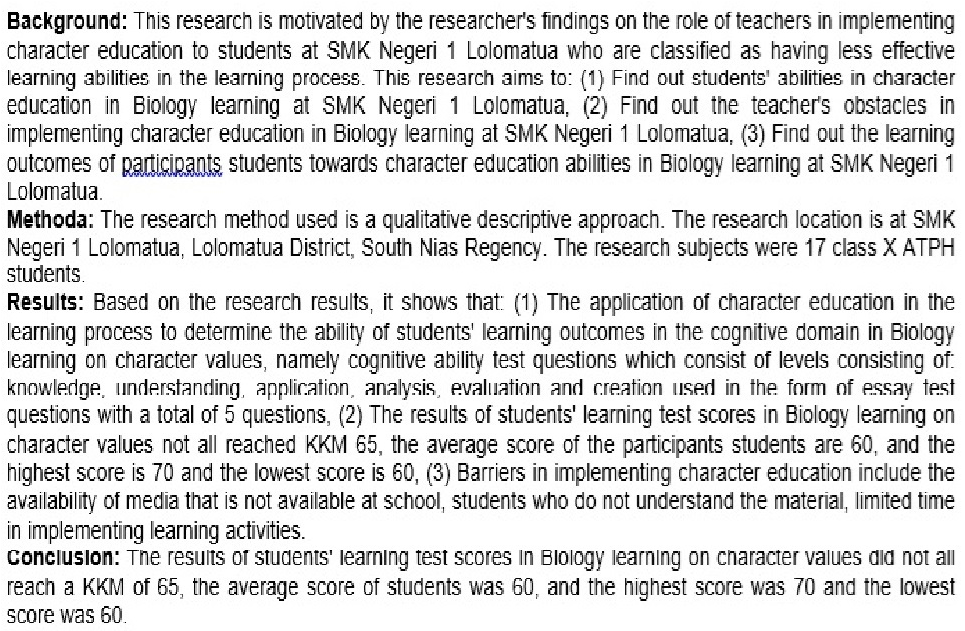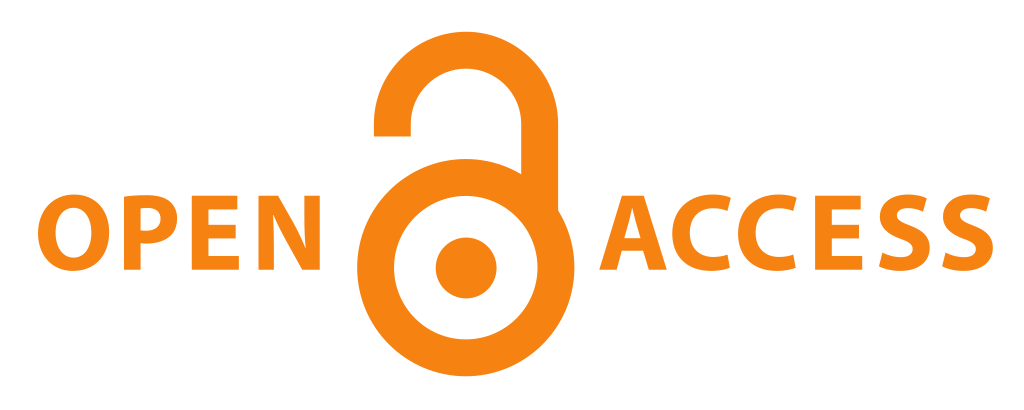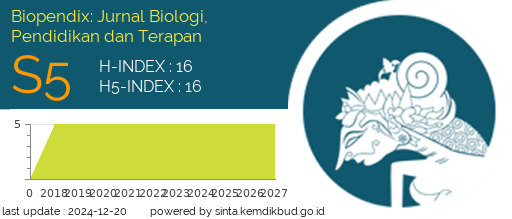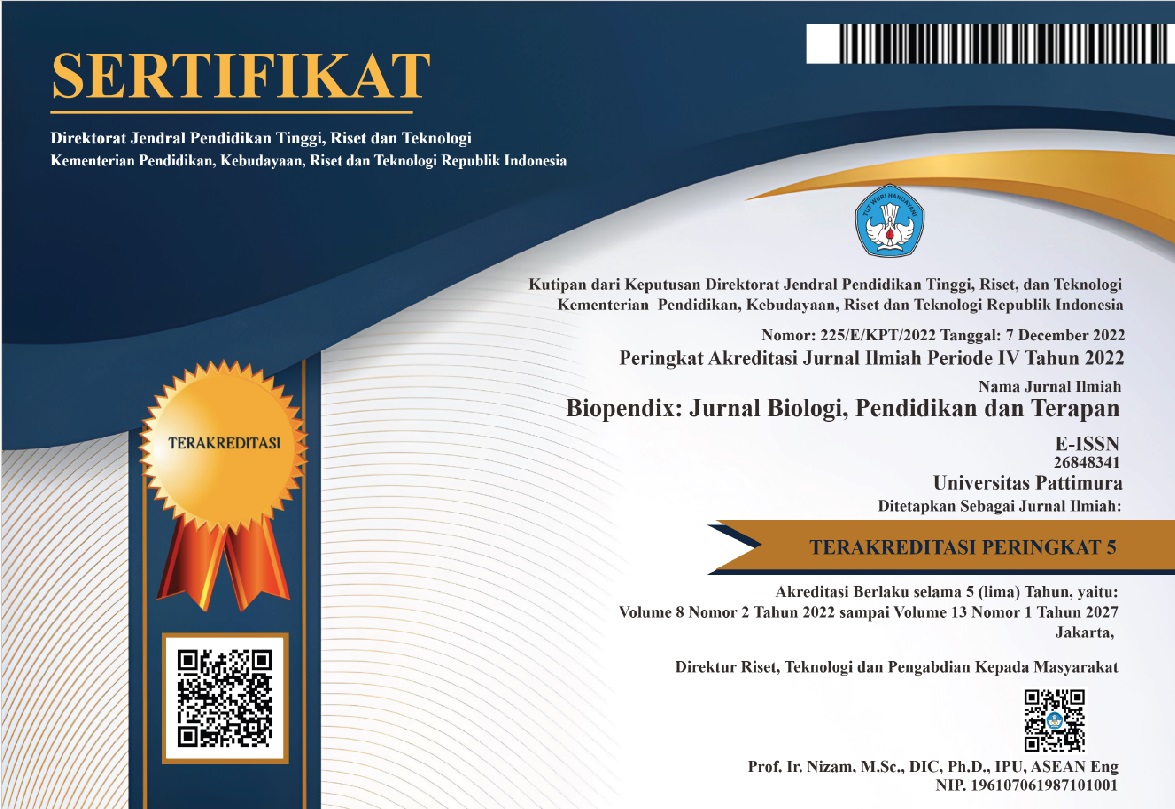ANALISIS PERAN GURU DALAM PENERAPAN PENDIDIKAN KARAKTER PADA PEMBELAJARAN BIOLOGI DI SMK NEGERI 1 LOLOMATUA
Abstract
Background: This research is motivated by the researcher's findings on the role of teachers in implementing character education to students at SMK Negeri 1 Lolomatua who are classified as having less effective learning abilities in the learning process. This research aims to: (1) Find out students' abilities in character education in Biology learning at SMK Negeri 1 Lolomatua, (2) Find out the teacher's obstacles in implementing character education in Biology learning at SMK Negeri 1 Lolomatua, (3) Find out the learning outcomes of participants students towards character education abilities in Biology learning at SMK Negeri 1 Lolomatua.
Methods: The research method used is a qualitative descriptive approach. The research location is at SMK Negeri 1 Lolomatua, Lolomatua District, South Nias Regency. The research subjects were 17 class X ATPH students.
Results: Based on the research results, it shows that: (1) The application of character education in the learning process to determine the ability of students' learning outcomes in the cognitive domain in Biology learning on character values, namely cognitive ability test questions which consist of levels consisting of: knowledge, understanding, application, analysis, evaluation and creation used in the form of essay test questions with a total of 5 questions, (2) The results of students' learning test scores in Biology learning on character values not all reached KKM 65, the average score of the participants students are 60, and the highest score is 70 and the lowest score is 60, (3) Barriers in implementing character education include the availability of media that is not available at school, students who do not understand the material, limited time in implementing learning activities.
Conclusion: The results of students' learning test scores in Biology learning on character values did not all reach a KKM of 65, the average score of students was 60, and the highest score was 70 and the lowest score was 60.
Downloads
References
Abidah, A., Aklima, A., & Razak, A. (2022). Tantangan Guru Sekolah Dasar dalam Menghadapi Era Society 5.0. Jurnal Ilmiah Profesi Pendidikan, 7(2c), 769–776.
Agustian, N., & Salsabila, U. H. (2021). Peran Teknologi Pendidikan dalam Pembelajaran. Islamika, 3(1), 123–133.
Ahyar, H., Andriani, H., Sukmana, D. J., Hardani, S. P., MS, N. H. A., GC, B., Helmina Andriani, M. S., Fardani, R. A., Ustiawaty, J., Utami, E. F., & others. (2020). Metode Penelitian Kualitatif & Kuantitatif. Yogyakarta: CV. Pustaka Ilmu.
Audie, N. (2019). Peran Media Pembelajaran Meningkatkan Hasil Belajar Peserta Didik. Prosiding Seminar Nasional Pendidikan FKIP, 2(1), 586–595.
Di Ohanes, R. C., Heni, A. M., Laksmi, J. N. A., Dwikurnaningsih, Y., & Satyawati, S. T. (2021). Manajemen Evaluasi Hasil Belajar Kognitif, Afektif, Psikomotorik: Tatap Muka dan Daring. Jurnal Prakarsa Paedagogia, 4(2).
Eskatur, N. P. U. (2018). Pengembangan Modul Berbasis Inquiry Lesson Untuk Meningkatkan Literasi Sains Dimensi Proses dan Hasil Belajar Kompetensi Keterampilan Pada Materi Sistem Pencernaan Kelas XI. BIOSFER Jurnal Tadris Pendidikan Biologi, 9(1).
Harahap, A. (2018). Implementasi Nilai-Nilai Karakter dalam Pembelajaran Tematik Kelas III SDIT Darul Hasan Padangsidimpuan. Abdau: Jurnal Pendidikan Madrasah Ibtidaiyah, 1(1), 18–36.
Herawati, H. (2020). Memahami Proses Belajar Anak. Bunayya: Jurnal Pendidikan Anak, 4(1), 27–48.
Khusnaeni, N., Supriyono, S., & Pangestika, R. R. (2022). Pengembangan Media Lift The Flap Book untuk Menstimulasi Kemampuan Kognitif Tema 7 Subtema I Siswa Kelas II Sekolah Dasar. Journal on Teacher Education, 4(2), 202–212.
Lestari, T. (2016). Perbandingan Hasil Belajar Ekonomi antara Siswa yang Pembelajarannya Menggunakan Model Pembelajaran Kooperatif Tipe Group Investigation (Gi) dan Tipe Team Games Tournament (TGT) Dengan Memperhatikan Kecerdasan Adversitas pada Siswa Kelas X SMA Negeri 12 B. Fakultas Keguruan dan Ilmu Pendidikan.
Magdalena, I., Hidayah, A., & Safitri, T. (2021). Analisis Kemampuan Peserta Didik Pada Ranah Kognitif, Afektif, Psikomotorik Siswa Kelas Ii B Sdn Kunciran 5 Tangerang. Nusantara, 3(1), 48–62.
Maulana, M. P., & Suryana, S. (2021). Upaya Tenaga Administrasi Pendidikan dalam Meningkatkan Mutu Layanan Administrasi di Sekolah. PeTeKa, 4(2), 266–274.
Santika, I. W. E. (2020). Pendidikan Karakter pada Pembelajaran Daring. Indonesian Values and Character Education Journal, 3(1), 8–19.
Susanto, A. (2016). Teori Belajar dan Pembelajaran di SD. Kencana.
Utomo, K. B. (2018). Strategi dan Metode Pembelajaran Pendidikan Agama Islam MI. MODELING: Jurnal Program Studi PGMI, 5(2), 145–156.
Wahyuni, S. (2022). Kurikulum Merdeka Untuk Meningkatkan Kualitas Pembelajaran. Jurnal Pendidikan Dan Konseling (JPDK), 4(6), 13404–13408.


This work is licensed under a Creative Commons Attribution-ShareAlike 4.0 International License.
Authors who publish with this Journal agree to the following terms:
- Author retain copyright and grant the journal right of first publication with the work simultaneously licensed under a creative commons attribution license that allow others to share the work within an acknowledgement of the work’s authorship and initial publication of this journal.
- Authors are able to enter into separate, additional contractual arrangement for the non-exclusive distribution of the journal’s published version of the work (e.g. acknowledgement of its initial publication in this journal).
- Authors are permitted and encouraged to post their work online (e.g. in institutional repositories or on their websites) prior to and during the submission process, as it can lead to productive exchanges, as well as earlier and greater citation of published works




 2
2






